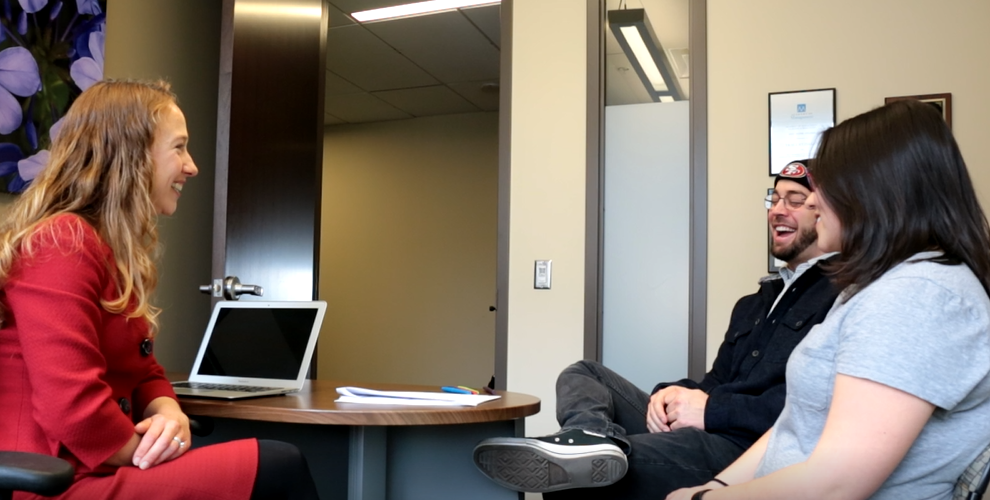
We are all wired in certain ways. The different facets of our personalities influence how we perceive the environment around us and how we identify with each other. When similar personalities meet, they connect. When dissimilar personalities meet, there is a higher risk of friction or discontent. These basic tenets are the foundation for helping to assess compatibility in the workforce.
CU Denver Business School Associate Professor Traci Sitzmann linked personality tests to occupations in her research titled, “A Process Model Linking Occupational Strength to Attitudes and Behaviors: The Explanatory Role of Occupational Personality Heterogeneity” recently published in the Journal of Applied Psychology.
Her research looked into different occupations and found that people who are in the same occupation tend to have the same personality type. On average, people with a specific personality type that matches that of their occupation are more satisfied with their job.
Understanding personality in the workplace
Personality is described as the ways in which an individual reacts to and interacts with others. Described in measurable traits that a person exhibits, personality can give managers insight into the behaviors of employees.
Eighty-nine percent of Fortune 100 companies use personality tests to assess potential employees. The primary test utilized is the Myers-Briggs Type Indicator (MBTI) or Myers-Briggs test. Designed to understand individual personalities, the MBTI looks at:
- How a person interacts with their environment
- Where a person directs his or her mental energy
- How a person makes decisions and copes with emotions
- A person’s approach to work, planning, and decision-making
- The confidence shown in their abilities and decisions
In essence, this test describes how a person might act in certain situations and interpersonal interactions.
Digging into the data
After examining data from 178,087 individuals employed in 315 occupations, Sitzmann and her colleagues uncovered three key insights about similarities in personality among people in the same occupation.
First, each of the 315 occupations was identified with a predominant personality type, meaning between 11 and 33 percent of the workers had that personality type. This finding suggests that occupations have disparate personality types.
Second, having a number of different personality types, or personality heterogeneity, in an occupation harms work-related attitudes and behavior. Personality heterogeneity correlated to lower satisfaction and higher intention to quit. In other words, occupations, where the majority of people have the same personality type, tend to be more satisfying.
Third, when your personality is different from your coworkers, it adversely affects your occupational attitude and behavior. This finding implies that people enjoy interacting with people who have similar psychological characteristics as themselves.

Meyers-Briggs’ contentious history
Research from the 80’s, 90’s, even up through 2013 has indicated that MBTI scores are not related to job satisfaction, motivation, commitment, or performance. Studies reported no significance in employees’ MBTI type with satisfaction, improved performance, workplace attributes, or behavior. Newer personality models, such as the Big Five, are recommended as valid options for employers to use.
Sitzmann’s research is one of several to support the idea that personality similarities indeed matter when it comes to occupations or companies. This is mirrored by other published research that suggests the MBTI gives important insight into different occupations, position types, or industries that may or may not suit different personalities. However, focusing on average personality scores alone is insufficient for understanding how personality affects work-related attitudes.
This assenting research goes back as far as its opposition. For instance, research in the 1990s found that managers tended to be similar types. It was also discovered that different companies might have a managerial style that leaned predominantly in one direction, and if everyone was in sync, the company as a whole saw increased success.
Personality influences a satisfying career
Ultimately, there’s a pattern. Supervisors are more likely to trust team members whose personalities are similar to their own. With better relationships comes more opportunities to demonstrate potential.
Alternatively, dissimilar personality types within an organization have a negative effect on attitudes and behavior. Team members do not jive with each other, tend to be unsatisfied, and are more likely to leave the company.
The microcosm of a company can also be applied to an occupation or industry as a whole. Therefore, it’s incredibly important to find an industry, an occupation, and then a company that’s composed of people who match your personality type. Not only is this valuable in day-to-day interactions, but also for a long-lasting and satisfying career.


